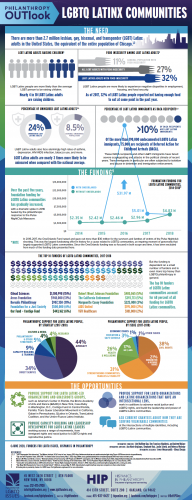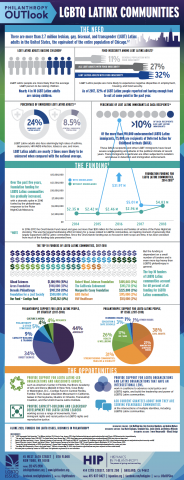Published: June 2, 2020
Author(s): Andrew Wallace, Ben Francisco Maulbeck, Lyle Matthew Kan
Topic(s):
Region: National
Philanthropy OUTlook: LGBTQ Latinx Communities, produced in partnership with Hispanics in Philanthropy as a part of their virtual summit, provides an overview of the unique needs of LGBTQ Latinx communities, spotlights the level of philanthropic support they receive, and offers key recommendations for funders looking to better support LGBTQ Latinx people.
The infographic highlights severe disparities faced by LGBTQ Latinx communities, particularly in economic opportunity and health outcomes, making LGBTQ Latinx people particularly vulnerable to the current COVID-19 pandemic and economic downturn. The infographic also finds that funding for LGBTQ Latinx people has been slowly increasing when excluding the dramatic spike of support following the Pulse Nightclub Massacre in 2016. Still, the funding is paltry. When excluding OneOrlando Fund grantmaking, funding for LGBTQ Latinx communities has never exceeded $5 million in any calendar year.
- More than 2.7 million lesbian, gay, bisexual, and transgender (LGBT) Latinx adults live in the United States. They face alarming disparities in access to healthcare and economic opportunity.
- Funding for LGBTQ LGBTQ Latinx communities is driven by a small set of funders. Between 2017 and 2018, the top 10 funders accounted for 68 percent of all funding for LGBTQ Latinx communities.
- Between 2016 and 2017, the OneOrlando Fund raised and gave out more than $30 million to support the survivors and families of victims of the Pulse Nightclub shooting. This was the largest fundraising effort in history for a cause related to LGBTQ communities, however, the funding was tightly focused in both scope and time.
- Funding for advocacy efforts received the plurality of funding by strategy. Support for civil accounted for the largest share of funding by issue and was largely driven by support for immigration and refugee issues.


